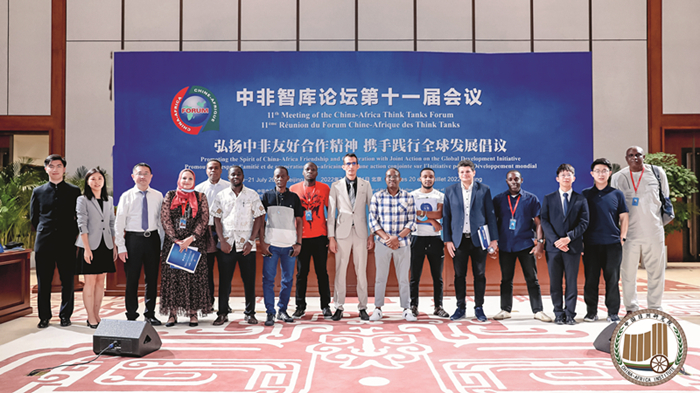|
||||||||||
| Home Nation World Business Opinion Lifestyle ChinAfrica Multimedia Columnists Documents Special Reports |
|
||||||||||
| Home Nation World Business Opinion Lifestyle ChinAfrica Multimedia Columnists Documents Special Reports |
| ChinAfrica |
| A Meeting of Minds |
| Chinese and African scholars share views at the 11th Meeting of the China-Africa Think Tanks Forum |
| CHINAFRICA 丨VOL. 14 September 2022 ·2022-08-29 |
The 11th Meeting of the China-Africa Think Tanks Forum was held online and offline from July 20 to 21. Themed Promoting the Spirit of China-Africa Friendship and Cooperation with Joint Action on Global Development Initiative, the two-day meeting was attended by more than 200 officials, scholars and other participants from China and Africa.
ChinAfrica spoke to some Chinese and African experts to learn their views on three topics at the forum: the Belt and Road Initiative and China-Africa cooperation on financing for development, the Global Development Initiative and the African Union (AU) Agenda 2063, and the spirit of China-Africa friendship and China-Africa relations in the new era. Excerpts of their comments follow:
China-Africa Cooperation Financing for Development
Efem Nkam Ubi
Acting Director and Associate Professor of Research and Studies, Nigerian Institute of International Affairs
In the past, China’s financial support for Africa’s development mainly came through joint cooperation and official assistance. For China’s financing to Africa to be effective, the amount of funds is not the most important factor; the key is to ensure that the money flows efficiently and the funds are put to best use. In African countries, good policies, strong leadership, and good governance are also important preconditions for the success of development finance in raising growth rates.
Abdou Diaw
Professor at Cheikh Anta Diop University, Senegal
China has always been Africa’s most important economic and trading partner. According to figures released by China’s State Council Information Office, by the end of 2020, direct investment of Chinese companies in Africa had surpassed $43 billion. China has established over 3,500 companies of various types across the continent. However, technology transfer should be further intensified in bilateral cooperation. Therefore, educational cooperation should be strengthened, and Chinese expert teams can be more involved in the training of African personnel, and sharing Chinese experience. Research institutions in agriculture, service industry, technology and other sectors should be established. Only through technical cooperation and technology transfer can the technical level of African countries be truly improved.
Hao Rui
General Manager of the Research and Development Department, China-Africa Development Fund
The current situation has made it more difficult for Chinese enterprises to invest in Africa, such as the interruptions in production and construction caused by COVID-19. Energy and food crises have led to high inflation, deteriorating business conditions, and debt defaults. Risk prevention and control by Chinese domestic financial institutions may affect investment and financing in Africa. The economies of China and Africa are complementary in general, and China and Africa are indispensable and important partners for each other. China’s Belt and Road Initiative and the nine programs put forward by Chinese President Xi Jinping at the Eighth Ministerial Conference of the Forum on China-Africa Cooperation in 2021 have all provided good opportunities for China-Africa cooperation.
To improve investment in Africa, the management and risk control capability of enterprises need to be strengthened. It is also necessary to deepen the cooperation between Chinese and African industrial chains and make use of innovative mechanisms, such as the China-Africa In-depth Economic and Trade Cooperation Pilot Zone, and African Continental Free Trade Area. The linking of the trade zones has set up a good platform for various market players in China to invest in Africa.
Xiao Hao
Executive Secretary General of China-Africa Economic and Trade Research Institute
China and Africa have good cooperation in industrial and supply chain connectivity, but they are also facing the impact of various uncertainties such as COVID-19, the conflict between Russia and Ukraine and the major power rivalry. Therefore, China and Africa should strengthen the ability to identify risks in industrial chain cooperation, classify risks, find win-win cooperation areas, reduce uncertainty from political changes, and find new opportunities.

Attendees of the 11th Meeting of the China-Africa Think Tanks Forum held in Beijing on July 21
Global Development Initiative and the AU Agenda 2063
Martin Mpana
Dean of the African Diplomatic Corps, and Ambassador of Cameroon to China
The Global Development Initiative is another favorable response from China to address many global challenges after the Belt and Road Initiative, especially for developing countries. It is a roadmap aimed at narrowing the North-South gap. The initiative includes eight key areas of cooperation, aiming to promote green and healthy global development and build a community with a shared future for mankind. Against the backdrop of today’s major power rivalry and regional conflicts, China and Africa should continue to uphold the spirit of sincerity and equality, mutual benefit and win-win results, fairness and justice, progress and innovation, openness and inclusiveness, and create a better prospect for Africa-China relations.
Zhang Yuyan
Director General of the Institute of World Economics and Politics, Chinese Academy of Social Sciences
President Xi Jinping’s Global Development Initiative calls on the world to stay committed to prioritizing development, a people-centered approach, bringing benefits for all, innovation-driven development, harmony between man and nature, and results-oriented actions. Regarding China-Africa cooperation, we should persist with innovation, and pay equal attention to the opening of the trade and investment markets.
Ebrima Sall
Former Executive Secretary of the Council for the Development of Social Science Research in Africa
The Global Development Initiative aims to promote the implementation of the Sustainable Development Goals and mitigate the huge impact of the epidemic on the world. This initiative was proposed at an opportune time, as it addresses current issues such as poverty reduction, food security, anti-epidemic fight, and green development.
Ezzat Saad Elsayed
Director of the Egyptian Council for Foreign Affairs
The Global Development Initiative is highly compatible with the AU Agenda 2063. Both initiatives aim to hold high the banner of multilateralism and promote China-Africa cooperation in economy, finance, infrastructure, investment and financing, and poverty reduction. Compared with the initiatives of Western countries such as the U.S., the Belt and Road Initiative and the Global Development Initiative are fairer and more equitable in helping developing countries. China believes that development is the key to addressing global challenges, and wants to help developing countries improve their independent development capabilities. China is a reliable and sustainable partner of African countries.

Two attendees pose before camera while attending the 11th Meeting of the China-Africa Think Tanks Forum held in Beijing on July 20
Spirit of China-Africa Friendship and
China-Africa Relations in the New Era
Garth Shelton
Professor of the University at Witwatersrand, South Africa
China is currently Africa’s ideal development partner, and China’s development experience has also brought important inspiration to Africa. Although China-Africa cooperation is facing challenges such as COVID-19, environmental problems, and the conflict between Russia and Ukraine, China and Africa are capable of finding ways to overcome challenges based on mutual trust. For example, China and Africa can try to establish a new financial model to help Africa deal with debt, inflation, and food and energy shortages. China and Africa could also cooperate to establish a China-Africa center in Beijing to conduct research on these common challenges.
Sibusiso Nkomo
Communications Coordinator of Afrobarometer
The latest poll data show that China has surpassed the U.S. to become the country with the largest influence in Africa, and its positive influence index also ranks first. These latest polling data actually show the public support for China-Africa friendship.
Liu Haifang
Director of Peking University Center for African Studies
In recent years, the poor operation of the Tanzania-Zambia Railway (TAZARA) due to the lack of maintenance has caused a lot of controversy in China. And there are also international voices questioning the sustainability of the TAZARA model. However, the TAZARA project has been playing an important role in boosting economic development and people’s wellbeing.
The TAZARA project has laid the value proposition for China-Africa cooperation. The TAZARA spirit shows that people in developing countries can jointly cope with difficulties amid the current global crisis and major changes, and pushes the world toward equality and justice. Aid is not only about projects, but also about sharing experience and knowledge.
David Mills
Associate Professor at the University of Oxford, the UK
Research shows that there were more than 8,000 African students studying for doctoral degrees in China in 2018, of which about 30 percent were government scholarship recipients. The cultivation of African doctoral students in Chinese universities has become a new ecology and trend of South-South cooperation in higher education and research. For some African countries, the number of Ph.D. students China has cultivated for them is comparable to that of their own universities.
Lina Benabdallha
Assistant Professor at Wake Forest University, the U.S.
The biggest feature of China-Africa cooperation is the “relational infrastructure and network” established between China and African countries, which is concentrated in the fields of people-to-people exchanges, human resources training, knowledge development and sharing. These “networks” and “social capital” in China-Africa cooperation are lacking in the cooperation between African countries and other major powers.
|
||||||||
| About Us | Contact Us | Advertise with Us | Subscribe |
| Copyright Beijing Review All rights reserved 京ICP备08005356号-5 京公网安备110102005860号 |